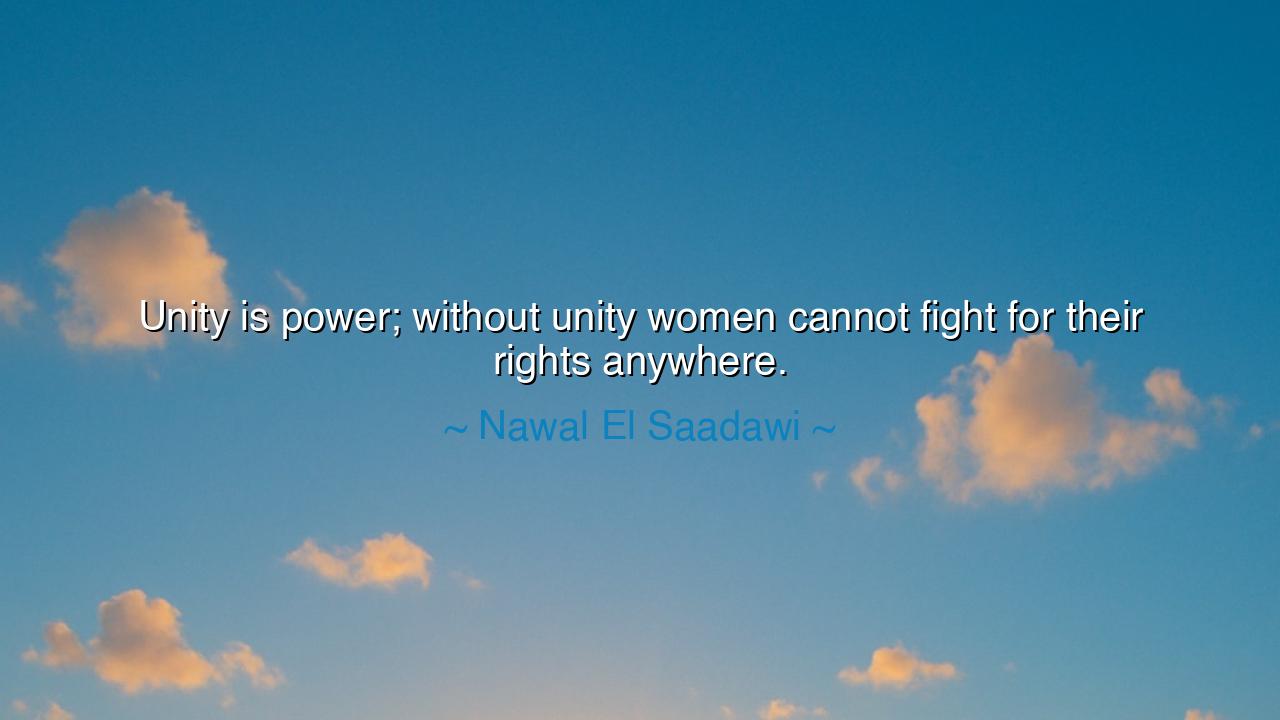
Unity is power; without unity women cannot fight for their






Hear, O daughters of the earth, the fiery words of Nawal El Saadawi, warrior of Egypt and fearless voice against oppression: “Unity is power; without unity women cannot fight for their rights anywhere.” In this declaration lies a truth carved from centuries of struggle—that the strength of women is vast, but it is scattered when divided. Only in unity does it blaze as a force that cannot be ignored.
For throughout history, women have been told they are powerless, isolated, and small. Yet Saadawi proclaims the opposite: their power is not lacking, but hidden, awaiting the moment of union. When one woman resists, she may be silenced. When many resist together, they become unshakable. Thus, the path to liberation is not solitary struggle, but solidarity—an unbroken chain of voices rising as one.
Consider the suffragists of Britain, led by Emmeline Pankhurst and her daughters. Alone, they were mocked and dismissed; united as the Women’s Social and Political Union, they marched, protested, and endured prison together. Their unity struck fear into governments and won women the right to vote. Had they remained divided by class or caution, their struggle would have withered. But in unity, their cause triumphed.
So too in Egypt, where Saadawi herself fought against patriarchy, censorship, and political tyranny. She knew well the dangers of isolation—she was imprisoned for her words, attacked for her defiance. Yet she taught that only collective power could secure lasting change. For women across the globe, her message was the same: to overcome oppression, they must see themselves not as rivals or strangers, but as sisters in a common fight.
Therefore, let this wisdom endure: unity is power, and without it, rights remain dreams. Women must join hands across borders, classes, and faiths, for the chains of patriarchy are universal, and so too must be the strength that breaks them. Nawal El Saadawi’s words burn as both warning and command: division is weakness, but unity is the weapon by which women can claim their rightful place in the world.






QCDu Quoc Chinh
Nawal El Saadawi’s statement is a stark reminder of the power of collective effort. But I wonder: Is unity always achievable? What happens when women, particularly from different cultures, socioeconomic backgrounds, or political beliefs, struggle to agree on a unified approach? Does the pursuit of unity sometimes lead to compromises that weaken the movement? How do we find common ground while respecting the diversity within women's rights activism?
BNTran Ngoc Bao Ngan
This quote brings to light an essential truth: unity gives strength. But can we also acknowledge the role of leadership and strategy within that unity? While the collective energy of a group is essential, how do we ensure that the fight for women's rights is also guided by clear goals and coordinated action? Does unity alone guarantee progress, or does it need to be coupled with effective organization and leadership?
HHello
I completely agree with this quote. Unity is essential, as without collective action, individual struggles may remain isolated. But is it possible that, in the pursuit of unity, some voices and issues are overlooked? For instance, are the needs of women from marginalized groups—such as women of color or LGBTQ+ women—sufficiently represented in the fight for women's rights? How do we balance unity with inclusivity in movements?
QTQuynh Trang
This quote is powerful, emphasizing the idea that unity is key to women’s empowerment. However, what happens when different women’s groups have conflicting priorities or methods? Can unity still prevail in such situations? Does the call for unity sometimes suppress important debates or voices within the movement? How do we ensure that unity does not mean conformity, but rather a collective strength that honors all perspectives?
MYMoto Yugi
Nawal El Saadawi’s quote speaks to the strength that comes from solidarity. It’s clear that without unity, individual voices might be drowned out, but can unity always overcome the challenges women face in their fight for rights? What happens when there are differences within the movement itself—can these be overcome without losing the momentum for change? Is unity an ideal or a necessity, and how do we create true solidarity in diverse groups?